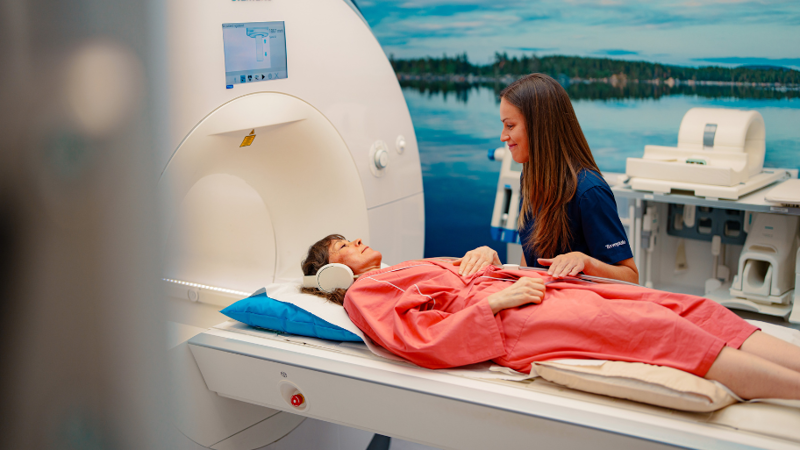Mental health-related absences reduced by 45% with brief psychotherapy - significant impact on other absences too
A study by Terveystalo* monitored the impact of brief psychotherapy for occupational health clients on sickness absence in 2019-2024.The study found that the use of brief psychotherapy reduced mental health-related sickness absence by 45% and other sickness absence by 19%. The study follows on from a similar study carried out 2 years ago and reinforces the importance of timely access to treatment for mental health symptoms.

At Terveystalo, the number of mental health diagnoses follows the global trend - it has been increasing for several years. However, despite the increase in the number of diagnoses, the trend in mental health-related absenteeism has not changed in the same proportion, and the increase in absenteeism in occupational health has finally come to a halt. This shows the importance of a well-timed short period of psychotherapy.
– For occupational health clients at Terveystalo, there is a shift in mental health-related absenteeism from long to short periods of absence. Although more and more people are affected by mental health problems, mental symptoms do not become chronic when treatment is started without delay. This reduces sickness absence and thus brings clear savings. According to the latest survey, timely treatment reduced sickness absence by an average of just over 10 days per employee, says Silja Komulainen, Occupational Health at Terveystalo.
Although talking about it is becoming more commonplace, only some of those who need treatment seek help
Studies show that only about 50% of those who would benefit from treatment seek it in time. This is also reflected in a recent survey by Terveystalo, which found that, compared to previous results, more people are already experiencing symptoms that have already progressed to moderate severity. When the future is uncertain, people persevere and stretch the limits of their ability to cope further and further.
– When the mind is depressed, people persevere at work, even if the mind is not fit for work. The work effort can suffer just as much from a home matter that weighs on the mind as the home environment from a work matter. However, the distinction between work-related and home-related mental health challenges is no longer significant, as the list of problems that affect work does not only arise at or from work. The weight on the mind is felt anyway, says Tuija Turunen, senior psychologist and psychotherapist at Terveystalo.
Effectiveness through appropriate treatment
Compared to the previous study, the benefits of brief psychotherapy have increased.
– Since the previous survey, Terveystalo has worked systematically to ensure that our professionals know how to address mental health issues and refer our occupational health clients who benefit from psychotherapy to the most effective treatment according to the Current Care Recommendation as quickly as possible. We have managed to steadily increase our internal referral rate and our goal is that by 2026, 25% of our clients struggling with mild and moderate depression and anxiety disorders will be referred for brief occupational health psychotherapy," says Komulainen.
To keep mental health-related absenteeism on a downward trend, we need more courage to talk about mental health and address challenges early. People are adept at covering up how they feel and pretending that everything is fine.
– To untie the knots of the mind before they get too tight, we need to have the courage to talk about it at a low threshold. Building healthy minds at work requires the contribution of all of us: employers, employees and occupational health," Komulainen adds.
* The survey data consists of brief psychotherapy visits of Terveystalo's occupational health clients in 2019-2024. The survey includes clients who have had an occupational health relationship with Terveystalo throughout the pre-treatment period (3 months), the duration of therapy and the post-therapy follow-up period (6 or 12 months). Thus, 17 920 occupational health clients and a total of 163 539 brief psychotherapy visits were included in the survey. The survey was carried out in accordance with the Data Protection Act (41§) and the data were processed securely without the use of identifiers. The results show a relative 45% reduction in mental health diagnoses, a 19% reduction in other diagnoses and a relative 37% reduction in sick leave for all diagnoses.
Read more occupational health articles

Terveystalo's digital services have been awarded the internationally recognized ISO27001 information security certification.
Terveystalo's information security practices, processes, and risk management are in line with international best practices.

Does massage help relieve stress? – Touch restores and calms the body and mind
Stress is not always visible on the outside, but the body does show signs when the strain increases. According to Lassi Ylönen, a trained massage therapist at Terveystalo Rela, the body often communicates stress through subtle signs.

Circular economy and artificial intelligence boost performance and improve care
At the heart of sustainable healthcare, technology serves as a tool for improving both the quality of care and accountability. Terveystalo favors solutions that combine sustainability, cost-effectiveness, and medical expertise.

Psychologist: How to make Christmas a relaxed and personal celebration
For many, the anticipation of Christmas begins when cities are decked out in seasonal lights and the first chocolates, calendars, and gingerbread cookies appear on store shelves. Christmas carols ring out and the Tonttuparaati choir sings “Kiire jo on! Kiire jo on!” (Hurry up! Hurry up!). This warm and atmospheric celebration also brings other feelings to mind: how on earth can we get through all this without losing our joy and peace in the rush?

Terveystalo and Gosta Labs deepen their cooperation: the goal is to streamline work with a superior patient information system
Terveystalo is deepening its cooperation with Finnish health technology company Gosta Labs and investing €1 million in the company as a minority investor. The aim is to jointly develop artificial intelligence solutions that improve the quality of care and the efficiency of reception work as part of Terveystalo's new patient information system, Terveystalo Ella.

First aid preparedness in companies requires action and courage
First aid skills increase resilience, but a barometer survey of Finnish organizations' first aid capabilities published in October reveals that the number of trained personnel is alarmingly low.